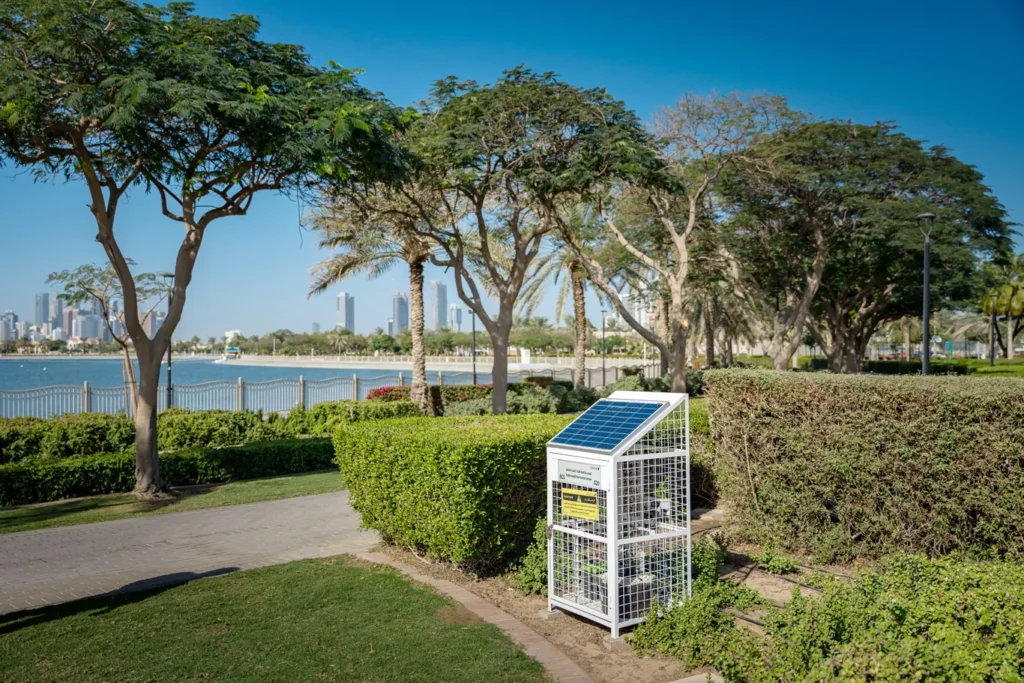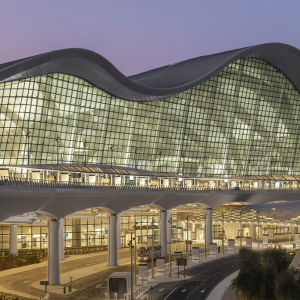In a world where climate change, urban sprawl, and population density are driving an uptick in vector-borne diseases, Abu Dhabi is showing how a future-facing, tech-driven solution can change the game.
The UAE Public Health Center (ADPHC), in collaboration with local municipalities and environmental agencies, has rolled out a smart mosquito-control network that’s already showing measurable success. By integrating solar-powered traps, artificial intelligence, and real-time data analytics, Abu Dhabi is setting a new standard in mosquito management—and creating a blueprint for cities worldwide.
How Smart Mosquito Traps Actually Work
At the core of this system are intelligent mosquito traps that look deceptively simple, but work with remarkable sophistication. Each unit is equipped with a CO₂ emitter and scent lures that mimic human breath and skin—specifically targeting female mosquitoes, which are responsible for bites and disease transmission.

Once the mosquito enters the trap, a silent fan draws it into a containment net. These smart traps are entirely chemical-free and environmentally safe. Even more impressively, each unit comes with built-in sensors and solar-powered transmitters that relay data such as mosquito count, temperature, and humidity straight to ADPHC’s cloud-based analytics platform.
This constant feedback allows the public health center to map breeding hotspots, track mosquito density in real time, and make quick, informed decisions on when and where to act. Instead of spraying pesticides citywide, interventions are now targeted, efficient, and far less disruptive.

The Numbers Speak Volumes
Since launching in 2020, the UAE’s smart mosquito-control network has reported extraordinary results across several key metrics:
- 400% increase in mosquito-capture efficiency compared to traditional traps
- 42% reduction in active mosquito breeding grounds identified through geo-tagged data
- 31% decrease in pesticide usage, preserving both human health and biodiversity
- 28% drop in operational fuel consumption, thanks to smarter routing and reduced site visits
- 94% of trap components are recyclable, reinforcing Abu Dhabi’s sustainability pledge
These numbers are more than statistics—they represent safer neighborhoods, fewer disease risks, and a cleaner environment for residents.
Healthier Living: The Human Impact
The most powerful story, however, comes from everyday life. Residents across Abu Dhabi have noticed the difference. Areas once thick with buzzing clouds of mosquitoes are now far more comfortable, allowing families to enjoy parks, balconies, and community spaces without concern.
Perhaps more importantly, there’s been a marked reduction in the use of chemical insecticides. Residents have reported fewer pesticide odors in the air and less exposure to toxins. This is especially significant for families with children, the elderly, or individuals with asthma and respiratory sensitivities.
And the system is interactive. Through the TAMM platform and the 800555 hotline, citizens can now report mosquito issues or request inspections with just a few taps on their phones. This two-way communication keeps the community engaged and builds a culture of shared responsibility.
Empowering Data, Advancing Science
Beyond mosquito control, the ADPHC’s system is yielding a treasure trove of data. By analyzing the behavioral patterns of mosquitoes—including peak biting times, preferred habitats, and seasonal movements—the center is building predictive models that forecast future outbreaks with growing accuracy.

There are plans underway to incorporate genomic surveillance into the trap network, which will allow public health officials to identify whether captured mosquitoes are carrying viruses like dengue, chikungunya, or Zika. Such proactive monitoring could enable early warnings and timely countermeasures before outbreaks spread.
The initiative has even sparked international interest, with experts from Asia, Europe, and Latin America reaching out to ADPHC to explore replicating the model.
Greener, Smarter, More Efficient
From an environmental perspective, the shift to a smart mosquito-control network is equally promising.
- Less pesticide spraying means healthier ecosystems and protection for pollinators like bees and butterflies
- Smarter deployment of field staff and traps has dramatically reduced the city’s carbon footprint
- Solar-powered devices lower reliance on grid electricity, boosting sustainability in urban infrastructure
- Waste-conscious design ensures the majority of materials used in the smart traps are either biodegradable or recyclable
This is more than a tech upgrade—it’s a full-circle approach to public health that respects both people and the planet.
Expanding the Success Beyond Abu Dhabi
While the success story began in Abu Dhabi, its influence is rapidly spreading. Dubai, for example, has already implemented over 230 solar-powered smart traps in key public areas. Other emirates are actively studying Abu Dhabi’s model as they look to modernize their own pest control operations.
This coordinated national approach—fueled by transparent data sharing, common platforms, and centralized reporting—is building a healthier, more connected UAE. It’s also allowing for innovation at scale: by analyzing shared data across emirates, the country can uncover macro-level trends and design more impactful long-term strategies.
Future Roadmap: A Bold Vision for 2030
ADPHC isn’t stopping here. The center’s roadmap includes:
- Full coverage across all high-risk zones, including parks, farms, and peri-urban areas
- Smarter AI models that predict outbreaks based on rainfall, temperature trends, and human activity
- Increased public engagement through awareness campaigns, school programs, and mobile alerts
- International collaborations to export UAE-born solutions to global cities facing similar challenges
By 2030, the goal is to transform mosquito-borne illness from a seasonal concern into a fully manageable, even predictable public health variable.
Reinventing Public Health for the Modern City
Abu Dhabi’s smart mosquito-control network is more than a technical achievement—it’s a statement of intent. It reflects the emirate’s vision of public health that is proactive, sustainable, inclusive, and rooted in evidence.

Where many cities are still chasing mosquitoes with outdated methods, Abu Dhabi is using data, design, and dialogue to get ahead of the problem—and keep its people safer.
The success of this initiative holds lessons not just for pest control, but for how cities can use technology to solve complex health challenges without compromising community well-being or ecological balance.
Final Thoughts: Hope Through Smart Innovation
In the heart of the desert, Abu Dhabi is quietly rewriting the playbook for urban health. With solar-powered traps, AI-enhanced data, and a citizen-centric approach, the UAE is proving that smart cities aren’t just about skyscrapers and sensors—they’re about people, comfort, and a better future for all.
As global temperatures rise and new public health threats emerge, solutions like these will be not only relevant, but essential. And if the early results are anything to go by, Abu Dhabi is more than ready to lead the way.
Do follow UAE Stories on Instagram
Read More: What Abu Dhabi is Teaching Us About AI-Powered Smart Cities













